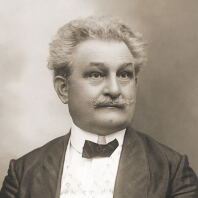Leoš Janáček
composer
Leoš Janáček, one of the leading music dramatists of the 20th century, had little success for many years. His first two operas Šárka and The Beginning of a Novel were failures. Only his third stage work Jenůfa, which the composer had worked on for almost ten years, was warmly received at its premiere in 1904. However, it was the sensational Prague revival of the work in 1916 that ensured the composer’s breakthrough. He was already over sixty years old – and the most productive phase of his creative life now began.
Leoš Janáček was born in Hukvaldy, a small town on the Moravian-Silesian border, on 3 July 1854. After the early death of his father, he trained as a teacher in Brno from 1869, where he also worked as a choral conductor. In February 1873, barely half a year after his 19th birthday, Janáček became choirmaster of the Brno craftsmen’s association Svatopluk. Three years later, he became choirmaster of Beseda břnenská, the leading Czech choral society, for which he composed numerous works. Until 1904, teaching music, history and geography was to remain Janáček’s main financial mainstay. At the same time, he attended the organ school in Prague for two years, where he received an additional qualification as a music teacher, and then attended the conservatory in Leipzig from October 1879 to February 1880. He then founded an organ school in Brno, where he was director until his retirement in 1919. In addition to his creative work, Janáček was also a music writer and dedicated himself extensively to folk music research, compiling over 10,000 melodies with ethnomusicologist friends. The Prague success of his opera Jenůfa was quickly followed by performances of the work in Vienna, Cologne, Berlin and New York, which brought Janáček international recognition for the first time. His best-known works include The Cunning little Vixen (1922/23), The Makropulos Affair (1923-25), the Sinfonietta (1926), the Glagolitic Mass (1926/27) and the Dostoevsky opera, From the House of the Dead (1927/28).